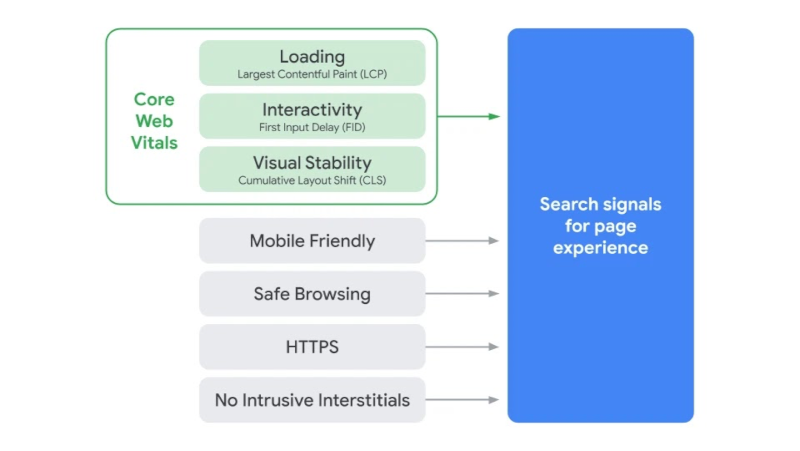Google has announced that they will be creating a new search engine ranking algorithm which will focus on the user’s overall page experience of a website. This announcement comes after the introduction of ‘Core Web Vitals’, which consist of three metrics to help web owners assess their user experience:
- Largest Contentful Paint (LCP) which calculates loading performance. Studies have shown that this should be under 2.5 seconds to provide user satisfaction.
- First Input Delay (FID) to determine interactivity speed. Websites should aim for a FID under 100 milliseconds.
- Cumulative Layout Shift (CLS) measures the visual stability of the web page while it is loading. The recommended movement is no more than 0.1.
These new vitals, coupled with the current user experience criteria, which includes whether the website is mobile friendly, runs on HTTPS, has intrusive advertisements, and how quickly the page loads. All of the above measures will be assessed to create an overall page experience for the search engine rankings.

The algorithm will also affect AMP’s (Accelerated Mobile Pages) and the ‘Top Stories’ section. Google has advised that if your business has AMP, then it should increase the page experience and has the possibility of moving your web page up the search engine rankings.
The new update is hoped to improve the user’s satisfaction of website performance. The company has alleviated concern around how businesses will manage these changes during the current economic crisis by releasing a statement about when the algorithm will happen. The new ranking system will not come into play until 2021, and they will make an announcement six months beforehand. Google has not specified how the individual metrics will be weighted, but have highlighted that superior website content will remain the most important factor in the rankings.
Businesses are anxious to know the full extent of the impact that the update will have on their website position, and whether it will have as ground-breaking a shift in the SEO industry as previous high impact algorithms. The 2003 Florida update saw the biggest upheaval in the search engine rankings, with the filter to stop unethical climbing tactics seeing between 50% and 98% of websites knocked out of the top 100 search results. The Panda and Penguin algorithms to tackle low-quality content web pages also caused a significant change in the way businesses conduct their websites. Time will tell whether the 2021 update will change the face of SEO. Why don’t you jump on the bandwagon now; contact us to see how we can help your website have the best user page experience.




Newsletter sign up
Lorem ipsum dolor sit amet, consectetur adipiscing elit. Nam vitae ante eu purus cursus aliquam. Pellentesque blandit viverra metus, a malesuada libero commodo eu.